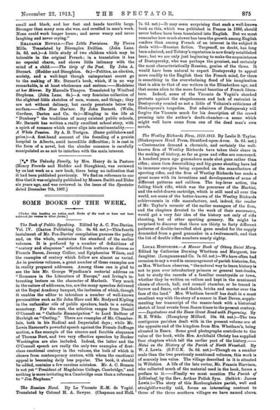SOME BOOKS OF THE WEEK.
[Under this heading we notice such Books of the week as have not been roserved for rniow in other forms.] The Book of Public Speaking. Edited by A. C. Fox-Davies. Vol. IV. (Caxton Publishing Co. 88. 6d. net.)—This fourth instalment of Mr. Fox-Davies' compilation pursues the policy and, on the whole, maintains the standard of the earlier volumes. It is prefaced by a number of definitions of "oratory and eloquence" selected from authors so diverse as Francis Bacon, Jeremy Collier, and Epiphemius Wilson, and the examples of oratory which follow are almost as varied. As in previous volumes, a great number of these examples are in reality prepared addresses. Among these one is glad to see the late Mr. George Wyndham's rectorial address on "Romance in the Literature of Europe," and Irving's in- teresting lecture on the character of Macbeth. Very much in the nature of addressee, too, are the many speeches delivered at the Royal Academy banquet, the inclusion of which, though it enables the editor to introduce a number of well-known personalities such as Sir John Hare and Mr. Rudyard Kipling in the unfamiliar role of public speakers, leads to a certain monotony. For the rest, the selection ranges from Daniel O'Connell on "Catholic Emancipation" to Lord Balfour of Burleigh on "Curling." There are examples of Mr. Chamber- lain, both in his Radical and Imperialist days ; while Mr. Lewis Harcourt's powerful speech against the Female Suffrage motion, a fine example of the sincere and forcible eloquence of Thomas Burt, and two very effective speeches by Booker Washington are also included. Indeed, the latter and the O'Connell speech are really the only two examples of first- class emotional oratory in the volume, the bulk of which is chosen from contemporary orators, with whom the emotional appeal is becoming daily less popular. The book, it should be added, contains a few careless mistakes. Mr. A. 0. Benson is not yet "President of Magdalene College, Cambridge," and nothing is more irritating to a Cambridge man than a reference to " Jimtephens."


















































 Previous page
Previous page